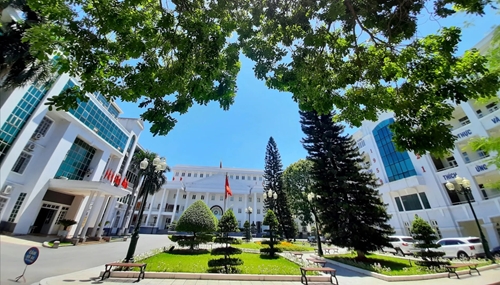To achieve these goals, Vietnamese educational institutions need to implement innovative solutions that can enhance quality and rankings in international assessments.
Gradual improvement in rankings
Master Nguyen Vinh San from the University of Da Nang's University of Science and Education, a key member of the Vietnam’s University Ranking (VNUR) team, stated that in recent years, Vietnamese universities have made significant progress in international rankings, reflecting their efforts to improve training and research quality. The number of Vietnamese universities in prestigious global rankings has been increasing, and their positions have improved year by year. Notably, Vietnamese higher education institutions are also featured in various types of university rankings, such as sustainable development rankings, field-specific rankings, and research rankings.
However, the positions of Vietnamese higher education institutions in these rankings remain modest, primarily around the top 1,000, or even over 1,500 with only one institution named in the top 500 list, according to the QS 2025 rankings. This highlights a significant gap in Vietnam's higher education compared to leading educational systems worldwide, requiring Vietnam to have strong policies to elevate its status and rankings globally.
    |
 |
|
Hanoi University in the capital city of Hanoi |
According to San, the current state of higher education requires appropriate policies to achieve the set ranking goals, avoiding dilution of resources. Successful countries in establishing world-class universities, such as China, serve as exemplary models. Vietnam currently has universities with the potential to reach global standards, such as national universities, regional universities, or newly-upgraded institutions. These should be prioritized for investment and given autonomy to develop and play a leading role in advancing Vietnamese higher education internationally. Furthermore, it is essential to identify and separate a group of universities capable of reaching international standards for targeted investment and support to help them meet global criteria.
Higher education institutions need strategies to attract and train a team of lecturers and researchers with international qualifications. At the same time, it is necessary to create conditions for them to improve their capacity and international publications.
Collaborative training and research programs with leading global universities should be promoted, with the development of flexible training programs that align with international standards to attract students.
High-quality educational institutions’ destination
Assoc. Prof., Dr. Nghiem Xuan Huy, Director of the Institute for Education Quality Assurance at the Vietnam National University, Hanoi, said from the perspective of educational science, university rankings are a comparison method for educational institutions to improve quality. This is also a form of external quality assurance.
From a national perspective, it can be seen that the competitiveness of higher education in Vietnam has increased. Vietnamese higher education institutions are gradually approaching the world's standards, quality, and capacity in training and scientific research, he said.
Being present in the rankings also helps a school create a reputation and image to promote international enrollment. University rankings are also a good information channel for learners to refer to and make decisions about where they will study, he said.
Huy said university rankings should not be considered the first and final goal of education, but rather the inevitable result and destination of a high-quality educational institution. Regardless of which ranking is involved, the first thing needed is attention to quality, demonstrated through scientific research activities, training and community development.
Each ranking has its own set of criteria. Therefore, universities need to carefully research and consider those ranking criteria to assess their suitability with their strengths and development strategies. The schools should develop plans and solutions based on that basis to both ensure the implementation of strategic goals and create competitive advantages in rankings, Huy said.
He noted that the common point of the prestigious rankings in the world today is that they all have focuses on the quality of international publications and academic prestige.
He advised the educational institutions to consider sustainable values when enrolling in rankings. Among the development indicators, priority should be given to those that both ensure sustainable development and help schools participate effectively in rankings.
Sharing the same view, Dr. Hoang Ngoc Vinh, former Director of the Department of Vocational Education at the Ministry of Education and Training, said international rankings need to be assessed comprehensively, considering both the benefits and the limitations that need to be overcome.
Instead of chasing the indicators, higher education institutions in Vietnam should focus on improving the quality of training, research and administration to create sustainable development steps, he said.
In addition, the State needs to develop major strategic projects to enhance the application and economic efficiency of scientific research. Together with considering scientific publications as an evaluation criterion, it is necessary to add criteria to measure the impacts of research on socio-economic development, he said.
Vinh said that the Government needs to have mechanisms to encourage and support universities in developing a technology transfer ecosystem. This includes upgrading facilities, training highly specialized human resources and building a cooperation network with businesses.
This will help bring research results to the market, create a stable source of income which will be reinvested in science and technology activities.
Proper and effective investment not only helps universities improve the quality of research but also makes an important contribution to the country’s sustainable development.
Source: VNA